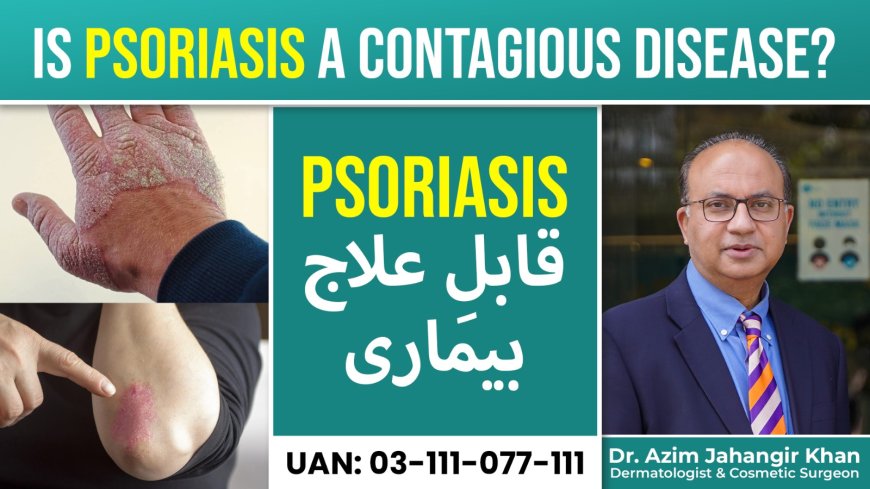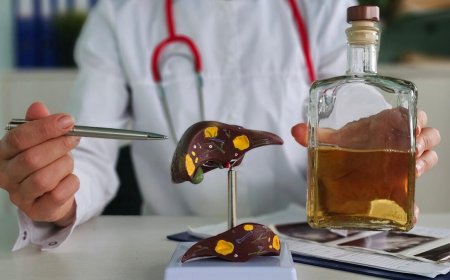What Is Psoriasis? Symptoms & Cure by Experts
Find out what psoriasis is and how to treat it. Expert dermatologists in Lahore explain everything in easy words for better skin health.

Psoriasis Made Easy: Expert Insights from Dermatologists
Psoriasis is a skin condition that causes red, dry, and itchy patches on the body. It can make skin thick and scaly. Many people in Pakistan suffer from it, but not everyone knows what it is or how to treat it.
In this guide, we will share all about psoriasis explained by dermatologist. You will learn what causes it, how it feels, and what treatments help. At Institute Cosmetique, expert skin doctors like Dr. Azim Jahangir, Dr. Amna M Raaj, and Dr. Saima Malik treat psoriasis with care and advanced tools. Their clinic is located at 190 DD CCA, next to Jamia Mosque, DHA Phase 4 Sector CCA, DHA Phase 4, Lahore, 54000.
Lets understand this skin condition step by step.
What Is Psoriasis?
Psoriasis is a condition where your skin grows too fast. This causes rough, red, and flaky patches. These patches can appear on your elbows, knees, back, or scalp. The skin may feel dry and itchy.
This is not an infection. You cannot catch it from someone else. Psoriasis is a long-term condition. It can get better and then come back again later. Thats why it needs expert care.
Is Psoriasis Contagious?
Many people ask if psoriasis spreads by touch. The answer is no. It is not contagious. You cannot catch it by shaking hands, sharing towels, or sitting close to someone. It comes from inside the body, not from outside.
It is linked to the immune system and your genes. That means if someone in your family has it, you might get it too.
Causes of Psoriasis
Immune System
The immune system fights off germs. In psoriasis, it becomes overactive and tells the body to make new skin cells too fast. This causes thick patches on the skin.
Family History
If your parents or close relatives have psoriasis, you may have a higher chance of getting it too. It runs in families.
Triggers
Psoriasis often gets worse because of some triggers. These include:
-
Stress
-
Cold weather
-
Dry skin
-
Infections
-
Cuts or scratches
-
Some medicines
Knowing your triggers can help you avoid flare-ups.
Signs and Symptoms of Psoriasis
Red and Scaly Patches
These are the most common signs. The patches can be small or large. They may appear on your back, scalp, knees, or elbows.
Itching and Burning
The patches often itch a lot. Some people feel a burning or stinging feeling too.
Dry and Cracked Skin
In some cases, skin becomes very dry and may crack or bleed.
Nail Changes
Your nails may become thick, change shape, or even separate from the nail bed.
Joint Pain
Some people with psoriasis may also get swollen or painful joints. This is called psoriatic arthritis.
Types of Psoriasis
There are different types of psoriasis. Each one looks and feels a bit different.
Plaque Psoriasis
This is the most common type. It causes thick, red skin covered with white or silver scales.
Guttate Psoriasis
This appears as small red dots on the body, often after a sore throat or infection.
Inverse Psoriasis
This happens in skin folds, like under arms, behind knees, or around private parts. The skin looks shiny and red.
Pustular Psoriasis
This causes white or yellow blisters filled with pus. The skin around them turns red.
Erythrodermic Psoriasis
This is rare and serious. It makes the skin turn red all over and peel off. It needs quick medical care.
How a Dermatologist Diagnoses Psoriasis
Skin Check
The dermatologist looks at your skin to see if you have psoriasis. They check the shape, size, and color of the patches.
Family History
They ask if anyone in your family has similar skin problems.
Skin Sample
Sometimes, the doctor may take a tiny piece of your skin to check under a microscope.
Best Treatments for Psoriasis
There is no full cure for psoriasis yet. But the good news is, it can be controlled. The goal is to reduce redness, itching, and flare-ups.
Creams and Ointments
These are used on the skin to reduce dryness, redness, and flakes. They are easy to apply and help with mild cases.
Light Therapy
Special light is used to slow down skin cell growth. This method is safe and often done in a clinic.
Oral Medicines
When creams are not enough, pills may be given. These help calm the immune system and reduce symptoms.
Biologic Injections
For serious psoriasis, injections are given. These target the immune system and stop the fast growth of skin cells.
Skin Care Tips for Psoriasis
Keep Skin Moist
Use a gentle moisturizer every day. This helps reduce dryness and flaking.
Take Warm Baths
Warm water with salt or oil can calm the skin. Dont use hot water as it makes dryness worse.
Avoid Scratching
Scratching can damage skin and cause bleeding. Use a cold compress if it itches.
Use Soft Soaps
Use mild, fragrance-free soaps. Harsh soaps make psoriasis worse.
Lifestyle Tips to Control Psoriasis
Stay Calm
Stress can trigger flare-ups. Try deep breathing or light exercise to relax.
Eat Healthy
Fruits, vegetables, and whole grains help the body heal. Avoid fried and spicy food.
Get Enough Sleep
Rest helps the body recover. Try to sleep 78 hours every night.
Stay Away from Triggers
Notice what makes your skin worse and avoid those things. It could be cold air, stress, or a new cream.
When to Visit a Dermatologist
You should see a dermatologist if:
-
You have red, scaly patches that dont go away
-
Your skin hurts, bleeds, or cracks
-
Creams from stores do not help
-
Your nails or joints are painful
-
You feel shy or sad about your skin
At Institute Cosmetique, top skin doctors treat psoriasis with kindness and care. You can visit Dr. Azim Jahangir, Dr. Amna M Raaj, or Dr. Saima Malik at 190 DD CCA, next to Jamia Mosque, DHA Phase 4 Sector CCA, DHA Phase 4, Lahore, 54000.
What to Expect at Your Appointment
The doctor will first talk to you about your skin. They may ask questions about your health and family history. After checking your skin, they will suggest the right treatment for you. You may also get tips on how to take care of your skin at home.
Sometimes, you may need to visit again to check progress. This helps the doctor see what works best.
Why Choose Institute Cosmetique?
At Institute Cosmetique, your skin is in expert hands. The team uses modern tools and safe treatments.
Dr. Azim Jahangir, Dr. Amna M Raaj, and Dr. Saima Malik have years of experience treating skin conditions like psoriasis. They listen carefully, explain everything clearly, and make a plan just for you.
The clinic is located in a peaceful area:
190 DD CCA, next to Jamia Mosque, DHA Phase 4 Sector CCA, DHA Phase 4, Lahore, 54000
Take the First Step Toward Healthier Skin
Psoriasis is not just a skin problem. It can affect how you feel, how you sleep, and how you live. But the good news is that help is available.
With expert care from the right dermatologist, you can feel better and live more confidently. At Institute Cosmetique, doctors like Dr. Azim Jahangir, Dr. Amna M Raaj, and Dr. Saima Malik are ready to help.
If you or someone you know is struggling with psoriasis, dont wait. Take the first step and visit a dermatologist who understands your skin.

































